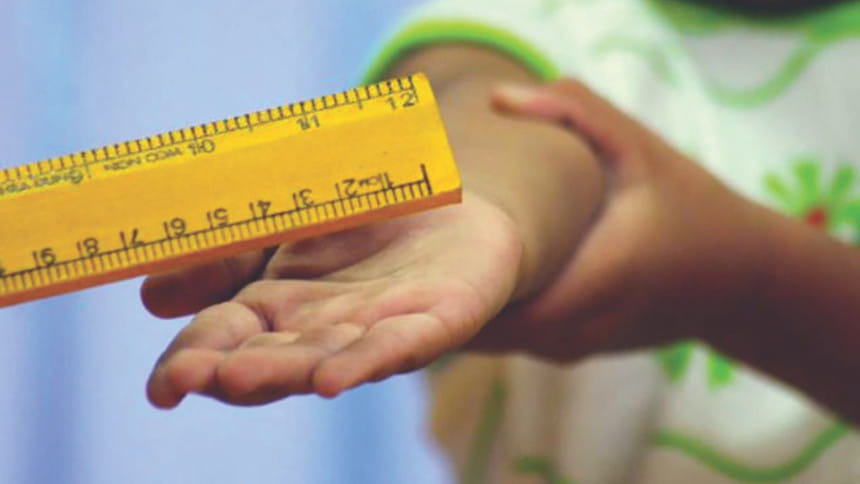A damaged child becomes a broken adult

Seemingly, it's hard for some school "teachers" to imagine or appreciate that children have rights. Too often when the topic of human rights is raised, it's interpreted to refer exclusively to adults; and children only become entitled to these rights when they become adults.
As we rapidly approach the end of another year, perhaps a reminder of certain facts relating to children won't go astray. The United Nations—the global organisation, which consists of 193 countries—determined via the UN Convention on the Rights of the Child treaty that corporal punishment (read: spanking, hitting, beating, chiding, shouting, screaming or otherwise) is a violation of human rights—a child's human rights. Yes, they have rights and they're recorded in black and white.
There are people who see no harm whatsoever in corporal punishment and that is understandable to a great extent. Some people find solace and take comfort living in a state of ignorance, denial and not facing facts. They've spent so many years consuming headache, indigestion, and pick-me-up pills and reaching for the bottle to squash the torment of the suppressed memories, they've forgotten the source of their problems and can no longer make the connection.
They rattle as they walk
Among them are those who actually boast, "I was given corporal punishment and it never did me any harm" as they unwittingly swallow a selection of multi-coloured tablets to try to ease their hurt and feel good. These people are easy to spot, they rattle as they walk.
Psychiatrists, psychologists and other mental health experts in the field of childcare have been saying for years that corporal punishment is not only non-beneficial to a child, but it's detrimental to the child.
One can argue that these people are only expressing opinions however learned they may be, and everyone is entitled to their opinion; but that's not the case. Their "opinions" are formed after extensive studious research that cannot be disputed and most certainly overshadow those held by a lowly educated village school "teacher".
Now these erudite opinions have been given the heavyweight backing of cold, hard, totally impartial science. Science has come to the forefront of the corporal punishment debate to scream it out loud that corporal punishment isn't in the long-term interest of children.
In the Journal of Family Psychology, researchers set out to address the question: Are psychological impacts of corporal punishment comparable with those of physical abuse? To make this determination, scientists evaluated over 100 studies representing over 160,000 children.
Elizabeth Gershoff, an associate professor of human development and family sciences at the University of Texas at Austin, states: "We found that corporal punishment was associated with unintended detrimental outcomes and was not associated with more immediate or long-term compliance, which is parents' intended outcome when they discipline their children."
Anti-social behaviour
In other words, not only was corporal punishment totally non-effective in making children obedient, but the punishment contributed to "increased anti-social behaviour, aggression, mental health problems and cognitive difficulties."
Alan Kazdin, PhD, and Sterling Professor of psychology and child psychiatry at Yale University, said: "You cannot punish out the behaviours that you do not want," therefore, "There is no need for corporal punishment based on the research."
To make it crystal clear, Kazdin underlines the conclusion of his findings in plain-talk language: "We are saying that corporal punishment is a horrible thing that does not work."
Kazdin says the reason corporal punishment doesn't work in the long-term is because children do not possess a developed punishment/reward mechanism (the byproduct of a maturing brain). Hence, the child is unable to alter behaviours following physical punishment.
Researchers interviewed parents and children aged three to seven from over 100 families. Analysis of the research concluded that children who are physically punished are more likely to embrace physical violence as a means of resolving conflicts with peers. That violence becomes the only language they know.
In other words, parents and teachers may be unwittingly doing the exact opposite to what they set out to achieve. Through corporal punishment, they are increasingly doing more damage than good.
Dr Gershoff said a child doesn't receive corporal punishment and then run out and rob a store or become a mugger. There are indirect slow changes as to how the child thinks (and feels) about things, about his teachers, about his parents, about society and they can manifest in many different ways, usually in the negative and it might take years to show. Why take that risk with a child?
If every child is a gift "on loan" from God, what right on earth does anyone have to abuse it or damage it physically or emotionally? Corporal punishment can give a child emotional and anger problems that can lead to a life of crime, aggression, bad social behaviour, wife-bashing, and stints, if not a lifetime, in jail. A damaged child becomes a broken adult and a broken adult owes nothing to society and cares little about the loveless relationship.
Studies also show corporal punishment may cause cancer to a child. Is that a risk any parent can afford to take and still claim to love the child?
As we approach 2018, it's time to leave the kids alone. It's time to realise whatever investments we make in the children, we are all beneficiaries through living in a better society.
It's time for parents and teachers to stop pushing the ignorance of their fore parents and old ways on their children and subjecting them to corporal punishment abuse.
It's time for parents, teachers and guardians to accept the facts that corporal punishment doesn't work and has no benefits and not wait for the next research paper to warn them of the grave dangers.
It's time for children to be given the open space for their petals to spread and show they can become good citizens of the nation, if they are allowed and encouraged to blossom in a corporal punishment-free, nurturing, caring, respecting, loving, world.
Schools should not be hell-hole fear factories where the once-in-a-lifetime—never again to be repeated—God-given gift of youth, fun and joy is beaten out; and hatred, anger, despise of society and revenge are beaten in.
When corporal punishment was outlawed in Bangladesh in 2011, Justices Md Imman Ali and Md Sheikh Hasan Arif of the High Court Divisional bench defined corporal punishment as "cruel, inhuman and degrading treatment and a clear violation of a child's fundamental right to life, liberty and freedom."
It's time for change and that time is now.
Sir Frank Peters is a human rights advocate, an award-winning writer, and a former newspaper publisher and editor.





Comments